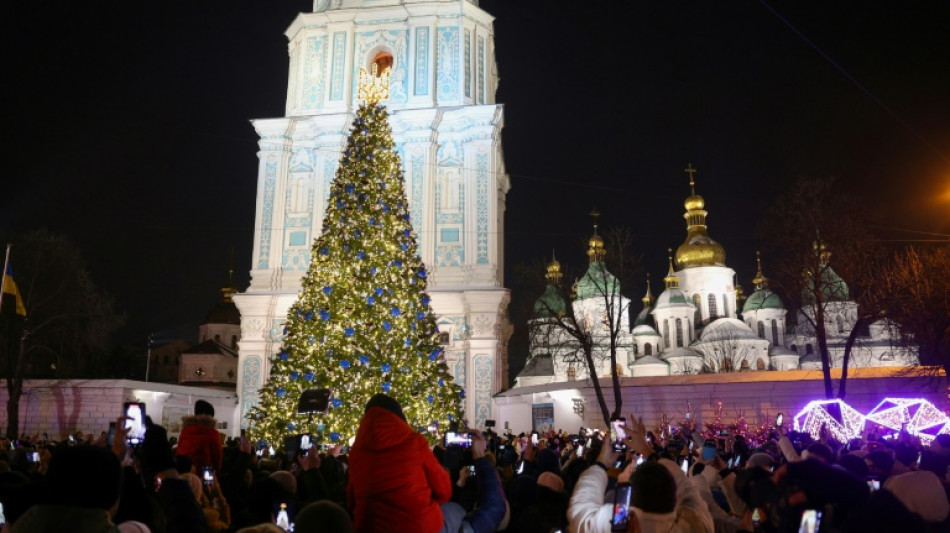
-
 Loaf behind bars: Aussie inmate says Vegemite a human right
Loaf behind bars: Aussie inmate says Vegemite a human right
-
In film's second act, 'Wicked' goes beyond Broadway musical

-
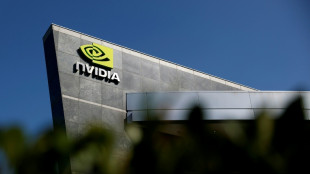 Asian markets track Wall St down with Nvidia, US jobs in view
Asian markets track Wall St down with Nvidia, US jobs in view
-
Scott Boland: the best 'spare' fast bowler around
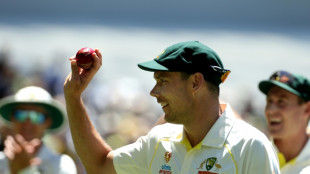
-
 Fire and Ashes: England bank on fast bowling barrage in Australia
Fire and Ashes: England bank on fast bowling barrage in Australia
-
North Korea says Seoul-US sub deal will trigger 'nuclear domino' effect
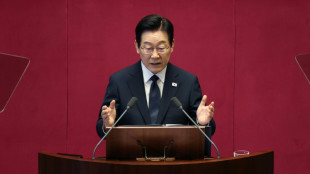
-
 Education for girls hit hard by India's drying wells
Education for girls hit hard by India's drying wells
-
Haitian gangs getting rich off murky market for baby eels
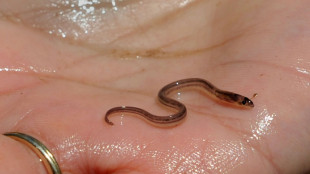
-
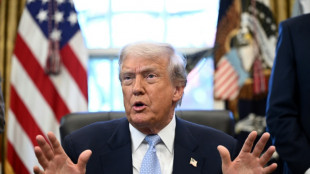 Trump says will talk to Venezuela's Maduro, 'OK' with US strikes on Mexico
Trump says will talk to Venezuela's Maduro, 'OK' with US strikes on Mexico
-
Oscar Piastri wins Australia's top sports honour
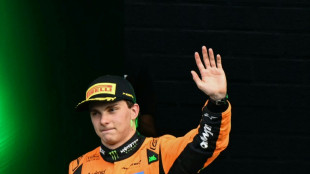
-
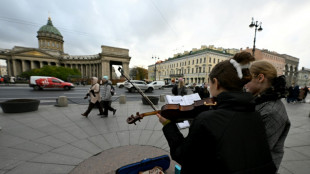 'Severely restricted': Russia's Saint Petersburg faces cultural crackdown
'Severely restricted': Russia's Saint Petersburg faces cultural crackdown
-
Polish PM denounces 'sabotage' of railway supply line to Ukraine
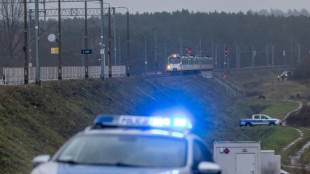
-
 UK toughens asylum system with radical overhaul
UK toughens asylum system with radical overhaul
-
Carney's Liberals pass budget, avoiding snap Canada election
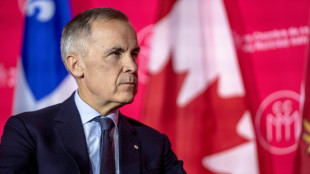
-
 LeBron back in training, edges closer to Lakers return
LeBron back in training, edges closer to Lakers return
-
Climate talks run into night as COP30 hosts seek breakthrough

-
 Germany and Netherlands lock up World Cup spots in style
Germany and Netherlands lock up World Cup spots in style
-
Germany's Woltemade hopes for 2026 World Cup spot after scoring again

-
 Germany 'send message' with Slovakia rout to reach 2026 World Cup
Germany 'send message' with Slovakia rout to reach 2026 World Cup
-
Trump unveils fast-track visas for World Cup ticket holders

-
 Netherlands qualify for World Cup, Poland in play-offs
Netherlands qualify for World Cup, Poland in play-offs
-
Germany crush Slovakia to qualify for 2026 World Cup

-
 Stocks gloomy on earnings and tech jitters, US rate worries
Stocks gloomy on earnings and tech jitters, US rate worries
-
'In it to win it': Australia doubles down on climate hosting bid

-
 Former NFL star Brown could face 30 yrs jail for shooting case: prosecutor
Former NFL star Brown could face 30 yrs jail for shooting case: prosecutor
-
Fate of Canada government hinges on tight budget vote

-
 New research measures how much plastic is lethal for marine life
New research measures how much plastic is lethal for marine life
-
Mbappe, PSG face off in multi-million lawsuit

-
 EU defends carbon tax as ministers take over COP30 negotiations
EU defends carbon tax as ministers take over COP30 negotiations
-
McCartney to release silent AI protest song

-
 Stocks tepid on uncertainty over earnings, tech rally, US rates
Stocks tepid on uncertainty over earnings, tech rally, US rates
-
Louvre shuts gallery over ceiling safety fears

-
 'Stranded, stressed' giraffes in Kenya relocated as habitats encroached
'Stranded, stressed' giraffes in Kenya relocated as habitats encroached
-
US Supreme Court to hear migrant asylum claim case

-
 Western aid cuts could cause 22.6 million deaths, researchers say
Western aid cuts could cause 22.6 million deaths, researchers say
-
Clarke hails Scotland 'legends' ahead of crunch World Cup qualifier

-
 S.Africa says 'suspicious' flights from Israel show 'agenda to cleanse Palestinians'
S.Africa says 'suspicious' flights from Israel show 'agenda to cleanse Palestinians'
-
South Korea pledges to phase out coal plants at COP30

-
 Ex-PSG footballer Hamraoui claims 3.5m euros damages against club
Ex-PSG footballer Hamraoui claims 3.5m euros damages against club
-
Mbappe, PSG in counterclaims worth hundreds of millions

-
 Two newly discovered Bach organ works unveiled in Germany
Two newly discovered Bach organ works unveiled in Germany
-
Stocks lower on uncertainty over earnings, tech rally, US rates

-
 Barca to make long-awaited Camp Nou return on November 22
Barca to make long-awaited Camp Nou return on November 22
-
COP30 talks enter homestretch with UN warning against 'stonewalling'

-
 France makes 'historic' accord to sell Ukraine 100 warplanes
France makes 'historic' accord to sell Ukraine 100 warplanes
-
Delhi car bombing accused appears in Indian court, another suspect held

-
 Emirates orders 65 more Boeing 777X planes despite delays
Emirates orders 65 more Boeing 777X planes despite delays
-
Ex-champion Joshua to fight YouTube star Jake Paul

-
 Bangladesh court sentences ex-PM to be hanged for crimes against humanity
Bangladesh court sentences ex-PM to be hanged for crimes against humanity
-
Trade tensions force EU to cut 2026 eurozone growth forecast


How Ukraine independence song became a Christmas classic
The catchy tune of "Carol of the Bells" may sound instantly familiar and evoke Christmas movies such as "Home Alone" but those humming along may have little inkling to the music's origins.
Used in countless holiday films and even performed by The Muppets, Carol of the Bells, a staple in western pop culture, stemmed from an early bid for Ukrainian independence.
The melody is a Ukrainian song called "Shchedryk", or New Year's carol, written by composer Mykola Leontovych and first performed in Kyiv at Christmas 1916.
This Christmas Eve, Ukrainian Radio Choir will perform the piece at Kyiv's Philharmonic at a sold-out concert that re-treads some of that musical history.
This comes as Ukraine celebrates Christmas on December 25 for the first time ever -- in sync with the West -- instead of on January 7 as in Russia.
- 'Musical diplomacy' -
The Kyiv concert on Sunday will recreate the first US concert performance of the Shchedryk, at a time when Ukraine was in a fragile state of independence after World War I.
The Ukrainian People's Republic had declared independence from Russia in 1918, led by nationalist politician Symon Petlyura.
To bolster the republic's standing, Petlyura decided to send the Ukrainian National Choir on a world tour.
"Petlyura wanted to persuade the Western entente to recognise Ukraine's independence, and so he initiated this project of musical diplomacy," said Tina Peresunko, who helped organise Sunday's concert.
The cultural researcher has written a book about Shchedryk and its links to Ukraine's struggle for independence.
The Ukrainian National Choir travelled to western Europe in 1919, then went to the United States, where Shchedryk had its national premiere at the Carnegie Hall in New York in October 1922.
Petlyura aimed "through song, through culture, through Ukraine's thousand-year-old folklore... to show that we are a nation, we are not Russians," Peresunko told AFP.
"The idea was through song to convey the right of Ukrainian people to independence.
"And it's very symbolic that it was Shchedryk, known to the world now as Carol of the Bells, became the hit of that tour."
Ultimately, though, Petlyura's musical diplomacy did not work and Ukraine became part of the USSR.
The original choir's singers remained in the US as emigres, fearing arrest by the Soviets.
The composer of Shchedryk never enjoyed the worldwide reaction to his piece: he was shot dead at his father's house in 1921 by a Soviet agent, according to the Ukrainian culture ministry.
But his music lived on.
In 1936, an American with Ukrainian roots, Peter Wilhousky took Shchedryk's music and wrote English lyrics titled Carol of the Bells, that have made it synonymous with Christmas.
- 'Difficult time for Ukraine' -
Ahead of Sunday's concert, the conductor of the Ukrainian Radio Choir, Yuliya Tkach, was leading a rehearsal in Kyiv, with singers wrapped up in scarves and jackets.
"Is it heated in here?" she asked at one point.
They were about to perform Shchedryk when an air raid siren sounded and they had to go down to a cellar.
Dressed in a traditional embroidered blouse, Tkach drew parallels between the turbulent time of the early performances of Shchedryk and now.
"Then there was a war, then there was a real struggle resulting in the Ukrainian People's Republic," she told AFP.
"Now this historical spiral is repeating itself."
The Kyiv concert on Sunday will recreate part of the programme from the first US concert which featured Shchedryk.
Tkach said the song is special to her: "First of all it's symbolic of Christmas holidays, secondly it is also about presenting Ukraine to the world, and thirdly, Mykola Leontovych is a composer dear to me."
The concert will also feature other songs from the original choir's world tour, some now rarely heard.
Peresunko scoured archives for the sheet music, some of which were only available in one copy.
"It's an extremely interesting programme," said Tkach.
"Some of the works were just a revelation to me."
The conductor said she would also like to take her choir on a tour abroad to "present the same repertoire to the world at this difficult time for Ukraine".
G.AbuOdeh--SF-PST




